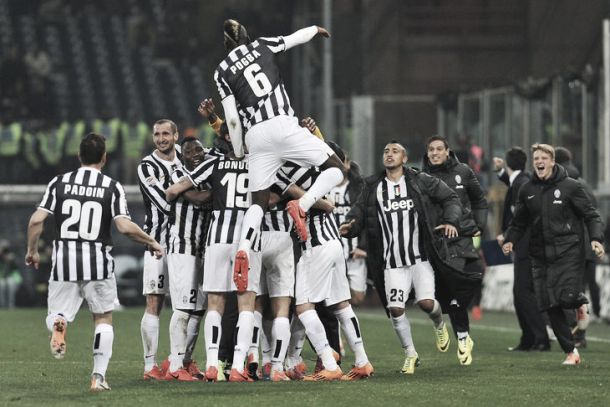May 14th, 2003. Juventus beats Real Madrid 3-1 with goals from David Trezeguet, Alessandro Del Piero and Pavel Nedved, overcoming a 2-1 deficit from the first leg, and reaches the champions league final for the fourth time in eight years, all of them under Marcelo Lippi’s guidance. An outstanding performance, only slightly eclipsed by Zinedine Zidane’s last minute goal ensures Juventus qualification right after beating the other Spanish titan (Barcelona) in the quarter finals. The Bianconeri are one of the best sides in Europe, counting with world class players like Del Piero, Davids, Buffon and Nedved among others and it looks like they are in their way to win at least a few European titles during that period. But that was the last time the Turin giants played a semi final in Europe until they’ll face Benfica in the Europa League semi finals in Da Luz stadium on April the 24th.
After Lippi left in 2004 to coach the Azzurri, Capello took over Juventus’ bench for two seasons. The bianconeri became a force in Italy winning two scudetti in a row setting a few records along the way, but Capello was never close to emulate his predecessor success in Europe and fell short in the Champions League, losing in both occasions in the quarter finals against English sides, Liverpool in 2005 and Arsenal in 2006. A defeat away in the first leg and a goalless draw in Turin in the return leg in both ties eliminated Juventus in Europe earlier than expected and cemented his reputation as a coach that can succeed in the league but not in Europe.
In the summer of 2006 Calciopoli would strike Italy and Juventus would suffer the consequences more than any other team in the peninsula. The relegation to Serie B would mean at least two seasons without participating in a European competition. The 2008-2009 season saw Juventus back in Europe faster than most would’ve expected. The performance in the group stage was a success, beating Real Madrid both home and away with a fantastic performance from Alessandro Del Piero, scoring three goals between both matches. In the round of 16 the Juventus kept it close but lost against eventual semifinalists Chelsea in a much disputed battle in Turin in the return leg. It looked like Juventus could finally compete again in Europe, the signings of Brazilian internationals Diego Ribas and Felipe Melo and the promising start of Amauri made fans believe international success was possible again, but it all went downhill from there.
In the following season only a draw was needed to advance to the second round against Bayern Wunich, and Juventus was quickly in advantage thanks to Trezeguet, but the Bavarian side would turn things around and win the match with a comfortable 4-1 that would be a premonition of the return leg against Fulham later that season. That result meant Juvents should play in the Euopa League. In the Round of 32 against Ajax, Juventus advanced comfortably with a win in Amsterdam in the first tie followed by a goallesdraw at home. In the following round Juventus had a great result again at home, beating Fulham 3-1 and it looked like the tie was sealed when Trezeguet put Juvents 1-0 in the return tie. But disaster struck again, Fulham scored four goals and eliminated Juventus from the Europa League.
A very weak performance that season in Serie A under Ciro Ferrara meant Juventus had to start directly from the Europa League in the 2010-2011 season in which was one of the worst performances ever from a Juventus side in Europe. Juventus drew all matches in the group stage, in a group that included Lech Poznan and Red Bull Salzburg (the remaining side being Manchester City). An even worse performance that season in Serie A meant Juventus wouldn’t even participate in Europe the following season. With all their focus in Serie A, Juventus was reborn from their ashes that season under Antonio Conte, winning the league for the first time in five years, and more impressively so, doing it without losing a match the whole season.
The following season Juventus returned to the Champions League after two years. For the first three matches the team struggled and drew all of them, including an away match against Nordsjaelland, one of the weakest sides in the competition (this meant Juventus had drew the last 9 matches they had played in Europe). It looked like the qualification was in danger but the team changed radically the following three matches, winning all of them (including a stunning performance at home against defending champions Chelsea) scoring 8 goals overall and not receiving any. In the round of 16 Juventus had to play Celtic, another great performance saw Juventus wining 3-0 away in the first leg and sealing the advance to quarter finals with a comfortable 2-0 at home. This meant Juventus extending their unbeaten streak in Europe to 18 matches and reaching the quarter finals of the biggest European competition for the first time since 2006. The rival this time would be Bayern Munich, the team that eliminated Juventus in their last Champions League with that 4-1 win in Torino. The side coached by Heynckes was one of the biggest, if not the biggest favorite to the title and would eventually win the competition in outstanding fashion. Despite Juventus keeping a respectable scoreline the tie was won comfortable by Bayern Munich, who won both matches 2-0. Again Juventus would fail to reach the semi finals stage in Europe.
For this season Juventus kept all their key players and made a huge improvement upfront, signing Carlos Tevez and Fernando Llorente. The Champions League was the big target again. The rivals in the group stage were Copenhaguen, Galatasaray and Real Madrid. It looked like Juventus were favorites to finish second behind Real Madrid and that they shouldn’t struggle so much to advance to the round of 16 for the second consecutive season. As in the previous season the team would struggle in the first matches, but this time the missed points would prove to be crucial unlike the previous season. In the first two matches Juventus would only get a draw against Copenhagen and fail to beat Galatasaray at home, dropping points that on paper should’ve gotten to advance to the next round. Against Real Madrid the performances were great but Juventus could only get a point from six possible. The first (and only) win would only come in the fifth match, at home versus the weakest side in the group, Copenhagen, thanks to a hat-trick from Vidal. Despite dropping many points in the previous matches Juventus arrived in Istambul only needing a draw to make it to the next round. During the first half a big storm broke through and the match had to be stopped and was rescheduled for the following day. The pitch was clearly damaged (suspiciously far more in the half Juventus was attacking) and the match shouldn’t have taken place, but it did and Wesley Sneijder gave Galatasaray a late goal to send them to the round of 16.
It was a very disappointing result for Juventus that was expected to reach at least the quarter finals, but it gave the club the opportunity to play the Europa League, a competition where the chances of winning the trophy are undoubtedly much higher than in the UCL. Juventus had no trouble beating Trabzonspor in the round of 32 with two easy 2-0 wins but it struggled against fellow Italian side Fiorentina. A poor 1-1 draw in the Juventus Stadium in the first leg meant Juventus was being eliminated with the 0-0 in the return leg until a brilliant costless kick from Andrea Pirlo minutes away from the end of the tie gave them the winning goal needed to advance. The poor form shown in Serie A the past two months translated into the tie against Lyon and the team was unimpressive in it but still managed to win both matches (0-1 and 2-1) and advance relatively easily to the semi finals.
Juventus is now only two matches away from reaching a European final for the first time in eleven years, with the added motivation that the final will be played at the Juventus Stadium, the ideal scenario to end the European title drought, and that winning it would make the club the most successful in the competition’s history, currently sharing that position with Liverpool and Internazionale, all with three titles. Not as prestigious as it once was and being overshadowed by the Champions League, the Europa League proved to be a great experience for many sides for future success in the biggest continental competition. Jose Mourinho’s Porto won the Europa League in 2003 and only a year later they shocked the world by winning the Champions League. Atlético Madrid won it in 2010 and in 2012 and are now on the verge of reaching the Champions League final after thirty years. A title here could be a huge boost for Juventus’ aspirations of making a deep run in the biggest European competition in the short term future and, why not, finally get that elusive third title almost twenty years after the last one.










































